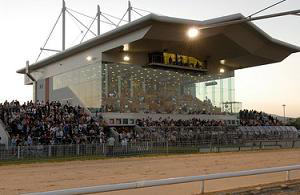
Sinn Féin European election candidate Matt Carthy, party president and Louth TD Gerry Adams and local councillors Edel Corrigan and Jim Loughran at the Sinn Féin meeting in Omeath last night
Louth TD and Sinn Féin president Gerry Adams and EU party candidate Matt Carthy last night addressed a meeting in the Granvue Hotel in Omeath.
The event focused on the crisis in rural areas and the threats posed to rural communities by rural crime and the threat to the post offices. The Narrow Water Bridge and future European funding for the area were also discussed.
Deputy Adams urged those present to support Matt Carthy who is standing for Sinn Féin in the European elections.
“Matt is an enthusiastic and energetic public representative. He will make an excellent MEP representing the needs of this area in Europe.”
The Sinn Féin leader warned that “at a time when rural Ireland is under attack and thousands of citizens, mainly young people, have been forced to emigrate, we need an MEP and a strong team of Sinn Féin local councillors who will defend rural Ireland and prioritise its needs.
“The policies of Fine Gael and Labour; including the property tax, septic tank charges, water charges later this year and other stealth taxes are impoverishing families and hurting rural communities.”
Adams also called on the government to take action to protect rural post offices.
“The recent report from the Irish Postmasters Union warns that the postal network will have declined by 48% by 2017 without a proper government plan. This would be devastating for rural communities and must be opposed.
“Sinn Féin is for equality of access to services, and greater investment in infrastructure and facilities outside of urban centres.”
Speaking on rural crime Mr Adams said: “One of the biggest issues now facing rural communities is crime and the fear that crime generates, especially among vulnerable citizens. Many elderly people in rural Ireland feel that they have been abandoned.
“The closure of Garda stations has put the safety of communities at risk as criminals and anti-social elements receive a boost of confidence in the absence of nearby Garda stations.
“The Irish Farmers’ Association, the Garda Representatives Association, political representatives from across rural Ireland and the vast majority of Gardaí, have rejected Garda station closures as they know the value of community policing.
“County Louth ranks fourth among the 26 counties for crime levels.
“Recently myself and Councillors Edel Corrigan and Jim Loughran met both An Garda Siochaná on the issues of policing, crime levels and cross-border crime. I have also met senior PSNI officers.
“Gardaí have acknowledged that the limited resources under which they have operated for many years, have now been cut further and that this is having a negative impact on policing.
“In recent responses to my parliamentary questions the Minister for Justice revealed that Garda numbers in Louth have fallen from a high in 2010 of 314 Gardaí to a low in 2013 of 286.
“Falling Garda resources will do nothing to reassure the community. What we need to see is a fully-resourced Garda plan for Louth which includes greater Garda visibility and an increase in community-based Gardaí.”
The Louth TD called for greater emphasis on partnership policing between communities and the Garda.
He said: “We need effective partnership between the police and local communities. The Department of Justice and Equality must give proper recognition and resourcing to such groups.
“Sinn Féin will continue to lobby the Minister for Justice on concluding the review of the Joint Policing Committees and will seek to ensure that the recommendations are effective and implemented.
“Sinn Fein will also lobby the Minister for Agriculture Simon Coveney to be more pro-active in conjunction with the IFA in relation to security on the farm. In the north, Sinn Féin Agriculture Minister Michelle O’Neill has made this a priority.
“The issue of crime and anti-social behaviour in this region cannot be separated from the general economic well-being and development of the county.”
Deputy Adams also called for a proper funding package to be put in place by government to deliver the Narrow Water Bridge.
He said: “The failure of the Government to ensure that the Narrow Water Bridge was built is an opportunity missed. It has been a bad blow to County Louth.
“Money from Europe became available through the Special European Union Programmes Body because of an under-spend and Sinn Féin Cllr Jim Loughran asserting a judicial challenge. The money offered was not enough to cover the costs and the project promoters were not in a position to raise the extra capital to cover the shortfall.
“The government needed to provide a relatively small €6 million funding package from the Taoiseach and the Department of Transport.
“When I raised this issue with the Taoiseach in the Dáil, Enda Kenny said that he was in support of the project. I am disappointed that the Taoiseach’s actions did not match his words.
“The bridge will be not be built on promises. A proper funding strategy needs to be put in place.
“The Narrow Water Bridge project can still go ahead in the future if the political will exists.”
Finally, Deputy Adams called for the creation by local councils on both sides of the border of a European Union Funding Unit that would service the region of Louth, Armagh and Down.
“This would allow councils to take full advantage of the opportunities provided by the European programmes, in particular the 2014-2020 INTERREG budget,” he said.
“This has been done to great effect in Belfast where millions of additional funding has been drawn down as a result.
“If parties are serious about investment, infrastructure, job creation, energy efficiency and tourism, they should back Sinn Fein’s proposal for a more professional approach to drawing down funding from the EU and promoting the County Louth Border region in Brussels.”




